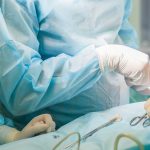The ongoing COVID-19 pandemic has affected U.S. health care in ways never seen before. One unfortunate result is that people have delayed medical care for other conditions. Focus spoke with Jeremy D. Richmon, MD, on why it’s especially important to keep up with head and neck cancer screenings and surveillance.
Studies have shown that since the COVID-19 pandemic started, an increasing number of people – about 40 percent of U.S. adults according to one study – have delayed or cancelled routine medical care due to concerns about going to the clinic or hospital.
When it comes to cancers of the head and neck, delaying diagnosis and care could have major effects on a person’s outcome and recovery, Dr. Richmon, director of Head and Neck Robotic Surgery at Mass Eye and Ear, told Focus.
“It’s critical to get head and neck cancer detected early to ensure the best prognosis. You’re much more likely to get cured of cancer when we find it early,” said Dr. Richmon. “The longer you wait and the more advanced the cancer when caught, the tougher the battle and recovery.”
[Watch this video with Dr. Richmon explaining the importance of head and neck cancer screenings]
Early detection and treatment crucial for head and neck cancer
Screening for head and neck cancer is often prompted by a person’s symptoms. These include: swelling or a sore in the mouth or on the tongue that does not heal; a lump or mass in the head and neck area; sore throat; pain when swallowing; and a hoarse voice.
People might confuse these symptoms with an infection and put off treatment, explained Dr. Richmon. He recommended anyone experiencing these symptom for more than two weeks get an exam. A screening can take place in a general ear, nose and throat (ENT) practice or with a specialist. People who suspect they have symptoms of head and neck cancer or have a new diagnosis can get evaluated at Mass Eye and Ear within two days.
Patients referred to screening will undergo a comprehensive head and neck exam. This includes a scope of the upper airway and a look at the larynx, back of the mouth, tongue and nasopharynx (the upper part of the throat behind the nose). If an otolaryngologist – head and neck surgeon (ENT) finds something that warrants further investigation, more imaging or a biopsy may be required.
If caught early, treatment for head and neck cancer is usually surgery or radiation, depending on the site of disease. Late-stage cancer treatment often involves multiple modalities, including chemotherapy, radiation and surgery. “The late-stage treatments can be far more intense with significantly more side effects,” said Dr. Richmon.
The rates of successful treatment for late-stage head and neck cancer drop dramatically. For late stage 3 and stage 4 cancers, prognosis can drop as much as 50 percent, according to some studies, compared to early stage cancers.
Head and neck cancer rates on the rise
Driven by the human papilloma virus (HPV), head and neck cancers have been on the rise in recent years. HPV is now the most common cause of oropharyngeal cancer in the U.S., accounting for approximately 70 percent of all cases.
Oftentimes, people with HPV-related head and neck cancer don’t have the traditional risk factors of smoking or drinking alcohol excessively. They’re often completely healthy people who end up with a neck mass.
Now, there is a vaccine that can prevent HPV-related head and neck cancer that’s recommend for all boys and girls at age 11 or 12. The HPV vaccine can be given routinely as early as age 9 through age 26, and some adults up to age 45 may receive it. However, most adults were already exposed before the vaccine was approved in 2006 and therefore may be at risk.
“That’s why screening and coming in for care is so essential if you suspect head and neck cancer,” said Dr. Richmon. “Cancer doesn’t wait for COVID-19, and neither should you.”
About Our Expert

Jeremy D. Richmon, MD specializes in head and neck cancer and microvascular surgery, and is an expert in minimally invasive robotic techniques in the head and neck. Dr. Richmon sees patients at Mass Eye and Ear, Main Campus.




Small lump under, side/burn, head hairs near left ear. Lump is located 3/8″ below the left side of the left eye socket and aligned with my left ear canal.
Noticed the lump about two weeks ago. About two years ago I was seen at Mass eye and ear, and diagnosed with total hearing loss due to long history of Meinyers disease. Doctor David Miller is my PCP at Mass General.
Hi William, we can’t offer medical advice on the blog, but to get seen by a specialist to make an appointment with our service. 617-573-3489. Here’s more information. https://www.masseyeandear.org/specialties/head-and-neck-cancer